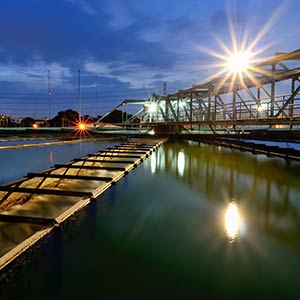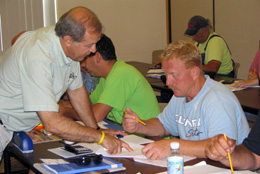Wastewater treatment has been a primary focus for NEIWPCC since our inception in 1947.
For many years, NEIWPCC played an important role in the planning and construction of wastewater treatment facilities in our member states. NEIWPCC helped lead the effort to establish design standards for such facilities, resulting in improved water quality.

NEIWPCC continues to support the industry by delivering training and certification of wastewater treatment plant operators. Our Regional Training Program offers a wide variety of in-person courses for operators at locations throughout New England and New York, as well as live virtual and self-paced offerings. The program typically conducts 50–70 courses per year that attract more than 1,500 students.
NEIWPCC also administers the wastewater training programs for the states of Maine (through JETCC) and Massachusetts.
This includes a significant role sponsoring or supporting programs that prepare operators to move into management. With many plant managers at or approaching retirement age, it’s essential to prepare talented operators to step into their shoes.

NEIWPCC’s Wastewater Division has expanded its focus to include such related issues as collection systems, certification, residuals, emerging contaminants, and technical assistance. NEIWPCC is also actively working on topics associated with smaller onsite or decentralized wastewater treatment systems, typically called septic systems. There are water quality challenges associated with septic systems that are only beginning to be understood.
Workgroups
Workgroups are NEIWPCC’s primary tool for fostering collaboration on important wastewater issues. Wastewater Division staff meet regularly with representatives from the New England states, New York state, the EPA, and other involved organizations. Group members exchange information and ideas on current issues, initiatives, and technical projects. We have workgroups devoted to wastewater training and technical assistance, onsite wastewater, collection systems, discharge permits, emerging contaminants, certification, underground storage tanks, and residuals.
Underground Storage Tanks
NEIWPCC’s focus on underground storage tanks, or USTs, began in 1984 when NEIWPCC, the EPA, states, tribes, and other partners started working together to prevent, detect, and clean up leaks from the tanks, whose contents can seep into soil and contaminate groundwater. NEIWPCC has long been a sponsor of the National Tanks Conference and Exposition. Since 2006, NEIWPCC has taken on the lead role for developing and coordinating the event, which is widely recognized as the place for the nation’s UST community to focus on progress and priorities.
NEIWPCC also coordinates an UST, LUST, and State Fund Workgroups; publishes LUSTLine, a national bulletin on tanks issues; and provides critical assistance to member states working to develop federally required training programs for UST owners and operators. NEIWPCC is also working with state and EPA staff to develop and provide UST inspector training opportunities for state programs nationwide.
Additional Resources
NEIWPCC produces publications and resources for both environmental professionals and the public. A number of these focus on wastewater and onsite topics and are listed below. A complete list of all our technical publications are located here.
- TR-16 Guides for the Design of Wastewater Treatment Works (revised 2011 Edition, as revised in 2016)
- The Northeast Guide for Estimating Staffing at Publicly and Privately Owned Wastewater Treatment Plants. An interactive excel application is also available for download. Please review page 75 of the guide before starting the interactive excel application.
- The Wastewater Treatment Plant Operators Guide to Biosolids Sampling Plans
- The Sequencing Batch Reactor Design and Operational Considerations
- Optimizing Operation, Maintenance and Rehabilitation of Sanitary Sewer Collection Systems
For more information, contact Christina Stringer, NEIWPCC’s director of wastewater and onsite programs.
